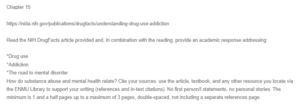Understanding Drug Use
What I Found Surprising
Intellectual disability means possible shortcomings in intellectual functioning, which are displayed through adaptive behavior and manifested over the developmental period, affecting a child’s academic performance. For a child to be classified as having an intellectual disability, the child’s intellectual capability must be below average (Kennedy, 2020). Notably, every child with an intellectual disability is unique in specific ways. There is nothing mild with intellectual disability, and not all students with this disability function the same. I have learned that intellectual disability is not only caused by genetic reasons but also environmental factors. Despite these children having learning skills, they conceptualize materials more slowly due to the struggle to generalize skills. Further, they need adequate support because of the difficulties in expressing themselves. As such, to deal with these types of learners, instructors should be more patient with such students.
Implication to Early Childhood Special Education
The video empowers Early Childhood Special Education teachers with knowledge on how to help students with intellectual disabilities overcome challenges and achieve academic excellence. From the video, it is evident that these learners are more vulnerable to sexual assault and other social evils because of their inability to express themselves (McEvers, 2018). When abused, they feel the urge to blame themselves, hence developing rage and hate towards others. As such, it is important to develop a positive relationship with these learners so that they can feel free to express themselves. Educating and training these children on how to express themselves when they find themselves in such conditions is one of the awareness about sexual abuse, which will help minimize incidences of abuse in children. It also empowers children with intellectual disabilities on how to be emotionally stable, reducing the risks of emotional and psychiatric disorders in the future.
References
Kennedy, M. (2020). CAP on Intellectual Disability. [Video] TED Conferences. https://vimeo.com/345751971
McEvers, K. (Host). (2018, 1 18). In their Words, Adults with Intellectual Disabilities Tell Their Sexual Assault Stories. All Things Considered. NPR. https://www.npr.org/transcripts/578956859
ORDER A PLAGIARISM-FREE PAPER HERE
We’ll write everything from scratch
Question

Understanding Drug Use
Chapter 15
https://nida.nih.gov/publications/drugfacts/understanding-drug-use-addiction
Read the NIH DrugFacts article provided and, in combination with the reading, provide an academic response addressing:
*Drug use
*Addiction
*The road to mental disorder
How do substance abuse and mental health relate? Cite your sources: use the article, textbook, and any other resource you locate via the ENMU Library to support your writing (references and in-text citations). No first person/I statements, no personal stories. The minimum is 1 and a half pages up to a maximum of 3 pages, double-spaced, not including a separate references page.

